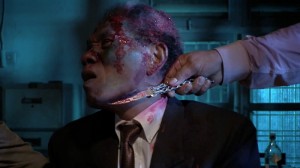Originally posted on December 15, 2013. — J.R.
One of the most debilitating facets of contemporary media discourse, at least in the U.S., is the unspoken assumption that serious discussion about such topics as torture, mass murder, and slavery can only enter the mainstream public sphere once it becomes tied to the sale of a current movie, regardless of how inane or or superficial or inadequate its treatment of that subject might be. If our discussion of American slavery can essentially be licensed by Django Unchained, which appeared to be the case last year, then I suppose 12 Years a Slave could be regarded as a partial corrective, even after one factors in the restrictive aspect of focusing on the relatively exceptional case of a non-slave forced to become a slave for many years. For me, the treatment of slavery as something relevant to both the present and more than just the U.S., in Pedro Costa’s sublime Sweet Exorcist (his half-hour episode in Centro Historico), is a more valid corrective and carries much greater force, not least because it has some access to poetry –- which, I would insist, is a crucial source of knowledge -– and beauty, and not merely to exploitation-movie assaults. Even though, paradoxically, Costa’s gives us the poetic insight without the concrete information that produces it.
If what The Act of Killing fundamentally has to teach us is the simple fact of the atrocity of Indonesian death squads, I would think that there would be more efficient and useful ways of acquiring this information. If, on the other hand, what this film is offering is some sort of poetic or psychological or political insight into that information, I’m still waiting for critics to furnish me with some compelling testimony about what these insights might be. Maybe they’re present in the film and I can’t see them. But having suffered through the 169-minute “director’s cut” of The Act of Killing twice, I find it hard to avoid the conclusion that the media’s validation of mass murderers and relative lack of interest in their victims is by now too well ingrained in our cultural reflexes to be irrelevant to the appeal of Joshua Oppenheimer’s film. Maybe there’s some other use value for his showcase for the feelings of mass murderers that I haven’t yet been able to tease out of this material. But if this is the case, I’m not willing to try again until someone offers me a valid reason of why I should. (At least Shelly Kraicer makes a brave try at this in a Facebook post; I wish he convinced me.)
Similarly, if Claire Denis’ Bastards is offering any poetic insight into its anger about greed and corruption, I wasn’t able to find it, and I haven’t yet found it in any of the film’s favorable notices, either. In this case, coming from a filmmaker whom I often admire, I can only assume that her pointed reference to Faulkner’s Sanctuary was more a matter of wishful thinking than one of artistic acknowledgment
What 12 Years a Slave, The Act of Killing, Bastards, and A Touch of Sin (the latter, for me, the best of a dubious lot) all seem to be proposing, in different ways, is that the shocks and jolts of exploitation filmmaking are the most expressive tools we have in order to arrive at the truth about the world we live in. But what is this truth, finally, but that venerable chestnut, “It’s only a movie”?

P.S. Richard Linklater’s Before Midnight certainly has its moments –- I especially like its Rohmeresque table talk at the outdoor lunch –- but its most conspicuous limitation comes to the fore when Julie Delpy angrily stalks out of the hotel suite near the end of the picture and the camera doesn’t go with her. And this sense of a closed world also has something to do with what makes Frances Ha seem to me like a retreat for Noah Baumbach. [12/15/13]

